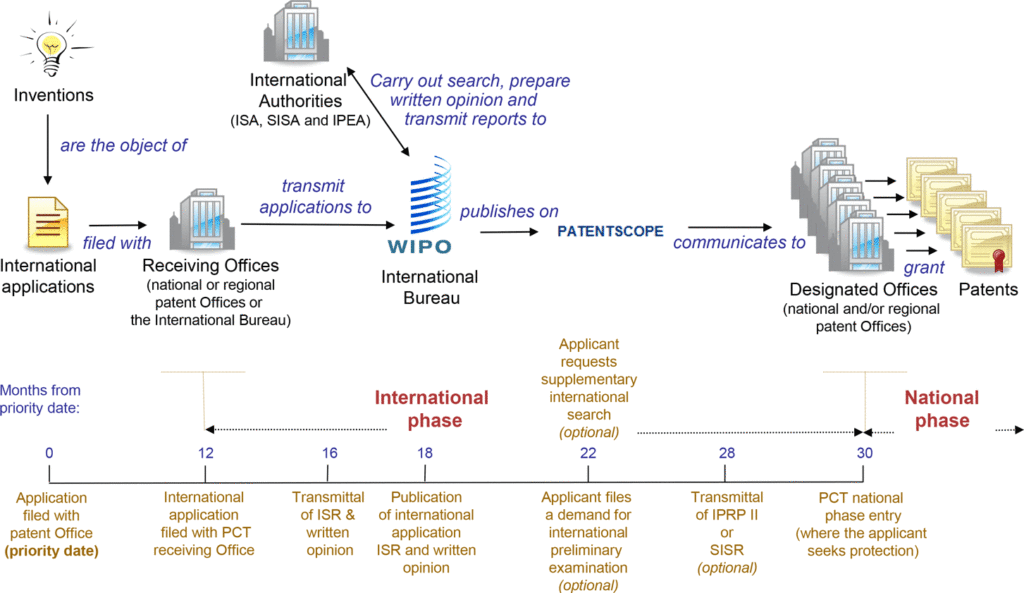根据《专利合作条约》(PCT)进入中国国家阶段是在世界最大市场之一获得专利保护的关键一步。中国广阔的市场潜力和制造能力使其成为专利申请的首选目的地 (迄今已有 157 个 PCT 缔约国),供全球专利申请人使用。本指南提供了进入中国 PCT 国家阶段的详细路线图,涵盖时限、要求、费用和实用技巧,以确保申请过程的无缝衔接。
什么是中国的 PCT 国家阶段?
PCT 体系简化了在多个司法管辖区寻求专利保护的过程(请参阅PCT国际阶段的更多信息)。在提交一份PCT国际申请后,申请人必须进入目标国家的国家阶段,以确保专利权。中国的国家阶段由中国国家知识产权局(CNIPA)管理,该局负责管理中国所有与专利相关的事务。
在中国获得专利需要遵守特定的程序和期限。错过这些步骤可能会导致专利权的丧失,因此仔细规划是成功的关键。

中国PCT国家阶段申请的关键截止日期
30 个月标准截止日期
申请者必须在以下时间内进入中国国家阶段课程 30 个月 通过提交申请表、PCT 申请文件的中文译文以及全额缴纳申请费和附加费(如适用),获得其 PCT 国际申请的优先权日期。
2 个月宽限期
如果错过了标准期限,中国允许 2 个月宽限期 (即 30+2)。不过,这需要支付 1000 元人民币的额外费用。如果在宽限期内未采取行动,申请将被视为放弃。
申请实质性审查 3 年
对于发明专利,必须在最早优先权日起 3 年内申请实质审查。我们建议客户在提交专利申请的同时申请审查,并在专利申请获得批准后支付 2500 元的审查费(而不是在提交专利申请时支付审查费,以免在专利申请被驳回时浪费金钱)。
专业提示:使用以下工具 PCT 时限计算器 以跟踪关键的时间节点。
国家阶段入境所需文件
要进入中国的 PCT 国家阶段,申请人必须提交以下材料:
- 申请表
申请人必须选择发明(专利)或实用新型,并在表格中输入正确的PCT申请号。 - 中文翻译
如果国际申请是以中文以外的语言提交的,则必须提供完整的中文翻译。这包括说明、权利要求、摘要和附图。 - 授权书 (POA)
必须提交签名的授权书。无需公证或认证。 - 修正案(可选)
申请人可以根据 PCT 第 19/34 条(自进入日起 2 个月内提交)或第 28/41 条(进入时提交),对权利要求或说明进行自愿修改,这些修改是中国审查的基础。 - 转让文件(可选)
如果申请人在进入国家阶段后发生变更,则必须提供申请的转让文件。 - 经认证的优先权文件(可选)
如果在国际阶段没有提交优先权文件,则必须在进入国家阶段时提交。
翻译:主要考虑因素
中文翻译的质量至关重要。翻译不准确会导致权利要求被曲解,甚至可能导致申请被驳回。准确翻译的技巧:
- 备注 中文专业术语背后的英文单词。
- 确保整个申请文件技术术语的一致性。
中国 PCT 国家阶段的收费和成本
中国进入国家阶段的相关费用包括
- 政府收费 下载 完整的收费表 更多信息,请参见专利费用 - PCT 申请费第二部分)
- 申请费:发明 900 元/实用新型 500 元。
- 附加费(额外申请费):
- 超权利要求费用(如适用):超过 10 项权利要求,每项 150 元人民币;
- 超页费(如适用):超过 30 页,每页收取人民币 50 元。
- 公开费(发明):人民币 50 元。
- 优先权费用(如适用):每张优先票 80 元人民币。
- 宽限期费用(如适用):人民币 1000 元。
- 发明实质审查费(到期日:自优先权日起三年内):人民币 2,500 元
- 律师费
在中国没有住所的外国申请人必须聘请合格的中国专利律师。律师费因申请的复杂程度而异。 - 翻译费
翻译费用取决于申请的长度和复杂程度。我们的收费标准是每个英文单词 0.1 美元,包括翻译后的校对。
了解更多关于中国专利官方收费标准的信息。
主要审查流程
- 实质审查(发明专利)
- 发明专利要经过严格的实质性审查。
- 在此过程中,申请人可以对办公室的行动做出回应或修改申请。
- 正式考试(实用模型)
- 实用新型只接受形式审查。
- 可要求提供专利评估报告,以增强可执行性。
- 拒绝和上诉
- 如果 CNIPA 驳回申请,申请人可在 3 个月内提出复审请求。
- 如果复审决定不利,可向 北京知识产权法院提起上诉。
5 个常见的输入错误
- 逾期申报或缴费:未能在 30+2 个月内提交申请或支付所有必要的政府费用
- 翻译问题:中文译文与原始国际申请文件之间的差异(如遗漏、误译)。
- 丢失的文件:未按要求提交表格、权利要求书、说明、摘要、图纸或 POA。
- 未指定专利类型:未能选择正确的专利类型(发明、实用新型),或为技术方案选择了不恰当的专利类型(例如,程序/方法不能作为实用新型授权)。
- 程序管理错误:无视 CNIPA 的更正通知。
常见问题
我可以在国家阶段修改申请吗?
是的。修正包括主动修正和被动修正:
积极主动的修订
- 用于发明申请、 有三次修改机会:
- 根据 PCT 第 28/41 条,在进入中国国家阶段时必须同时提交;
- 当申请人提交实质审查申请时;
- 自收到参加实质性考试的通知起 3 个月内。
- 然而,对于实用新型的应用除了上述 PCT 的 28/41 之外,还有 机会只有一次 修改:
- 自申请(进入)中国之日起 2 个月内。
被动修正。
- 申请人在收到申诉书后,可根据申诉书中指出的问题修改申请。
查看更多关于国际阶段第 19/34 条修正案的信息。
中国的国家阶段是否包括香港、台湾或澳门?
香港
就香港而言,申请人可在 CNIPA 公布日起 6 个月内记录标准专利,并在 CNIPA 授予日起 6 个月内注册标准专利。查看更多有关 在香港申请标准专利的信息。
此外,申请人可在进入中国国家阶段之日起 6 个月内提出短期专利申请。查看更多有关在香港申请短期专利的信息。
台湾、澳门
PCT 自 1997 年 7 月 1 日起适用于中国香港,但不适用于中国澳门。台湾不是 PCT 成员,因此不能接受 PCT 申请。
就台湾而言,由于台湾是 WTO 成员国,WTO 成员国的任何申请人均可在自优先权日起 12 个月内要求优先权。更多信息 台湾的 PCT.
就澳门而言,由于《巴黎公约》适用于澳门,《巴黎公约》成员国的任何申请人均可在优先权日起 12 个月内要求优先权。(葡萄牙是《巴黎公约》(1883 年)的原始签署国之一,在 1999 年 12 月 20 日主权移交给中国之前,《巴黎公约》的保护范围已延伸至澳门。)更多信息 如何在澳门保护专利.
申请需要多长时间?
一般来说,申请人会在 2-3 周内收到获准进入中国国家阶段的通知(见下文示例),并获得国家申请编号,然后等待进一步审查。

您能加快考试速度吗?
可以。查看更多关于如何在中国申请专利PPH的信息
能否通过减少索赔数量来节省额外的索赔申请费用?
权利要求的数量由 PCT 国际申请决定。
微型实体能否要求减免政府收费?
由于外国申请人无法提供 中国认可的收入证明除非他们在中国做生意,否则不可能减免公务费。
如何降低中国国家阶段的官方收费?
可批准豁免的情况如下:
- 如果 CNIPA 是 PCT 申请的受理局,则免收申请费和附加申请费。
- 如果 CNIPA 出具国际检索报告和国际初步审查报告,则免收实质审查费。
- 如果欧洲专利局、日本专利局和瑞典专利局出具国际检索报告,则实质审查费可享受 20% 折扣。
什么样的主题不能申请专利?
就发明而言,商业方法不能申请专利。
对于实用新型,方法/程序不能申请专利,应转为发明申请。
更多信息
有关 CNIPA 的更详细指导,请参阅 关于 PCT 国际申请进入中国国家阶段的常见问题。
欲了解全面详情,请参阅 WIPO 的 PCT 中国申请人指南。
计划将 PCT 扩展到中国?
国家阶段费用因翻译字数和权利要求数量而异。如果您需要估算政府费用,请将您的 PCT 申请号发送给我们。
我们的团队曾为来自美国、加拿大、俄罗斯等国的客户在中国成功处理过许多 PCT 国家阶段案件,具有丰富的经验,可以处理您的案件。请将您的 PCT 申请号发送至 contact@gbaiplawyer.com 与我们联系。

